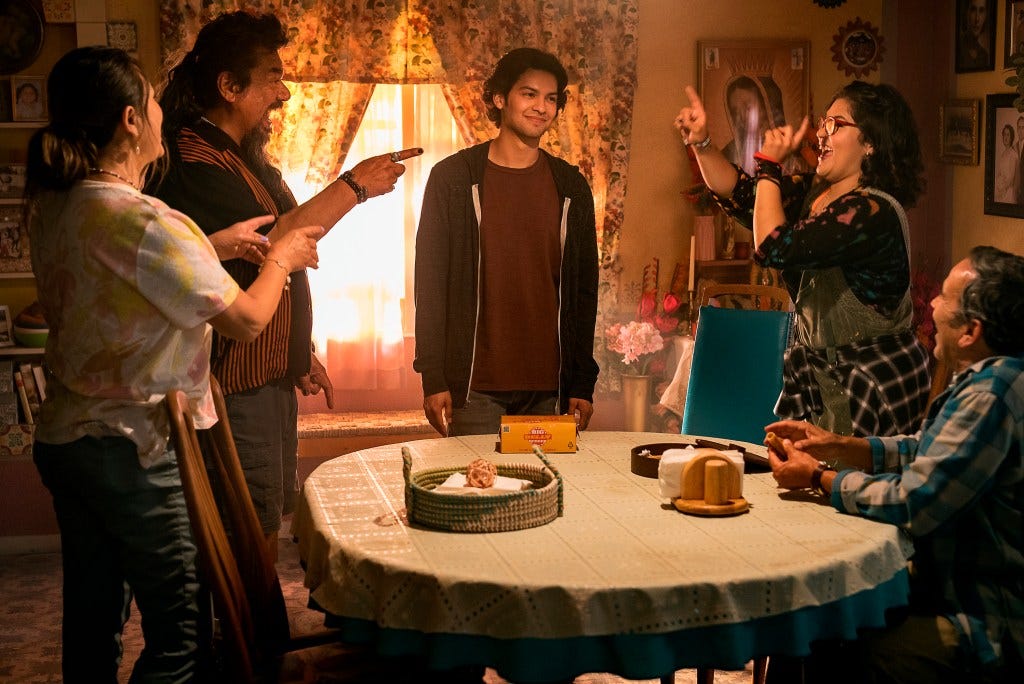With hopes that you’re all enjoying the weekend, readers, here’s Part Three of our catch-up on last year’s closing TV and film: Heros, superheros, and royals — o, my!
The Crown (Final Season)
Netflix • Drama • Legacy
Synopsis
The central members of the British royal family each consider what it might mean to escape the requirements of their highly privileged but highly public lives.
My take
The Crown is and has always been one of the premiere TV dramas of our times. As divisive as it may be for its premise (i.e., the inherited wealth and status of the British royal family) in a climate of precarious democracy and ever-reaching plutocracy, the series in terms of the work that has gone into creating and presenting it (in writing, in acting, in directing, in editing, and beyond) has consistently been undeniably good. To wit, consider that its fourth season is to date the only season of dramatic television to ever win all seven major Emmy awards for Drama (i.e., all four acting awards, directing, writing, and series) within a single year (Nakamura for The Wrap, 2021). Really consider that fact! It means that, for all the:
Game of Thrones (Benioff & Weiss [creators], 2011-2019),
Succession (Armstrong [creator], 2018-2023),
Mad Men (Weiner [creator], 2007-2015),
The Sopranos (Chase [creator], 1999-2007),
Hill Street Blues (Bochco & Kozoll [creators], 1981-1987),
Breaking Bad (Gilligan [creator], 2008-2013),
{your favorite other drama series}
hype there has ever been even at its maximum, no drama series — however popular or prestigious — has ever in the 75 years of the Emmys set that record until The Crown did in 2021 (or has matched it since).
Now concluding in a sixth season split into two distinct chapters — one a meditation on the final days of the late Princess Diana and the other an illumination of legacy in all its respects — The Crown — thanks in large part to:
the expert hand of its creator and primary writer Peter Morgan (whose talents at exercising the authentic spirits of key international political figures in especially the unique contexts of their contemporary media cultures have already garnered the man Oscar and Tony nominations and two Emmy wins [unsurprisingly, for The Crown’s stellar fourth season in 2021]), and to
the powerfully mercurial capacities of the cast to authentically ride the fine line that Morgan’s hand has drawn between untouchable dignity and raw humanity, a line that eternally defines the series as a creative project and a treatise —
certainly earns its fare-well flowers, departing with a latter half curated to near perfection, with scene after scene that made me exclaim aloud while watching, “What a great scene!” Truly, readers, I was pleased to the point of being utterly delighted, especially when long callbacks to the show’s earliest days closed thematic loops I well remembered and dearly hoped the show would eventually return to address. Along the way actors Imelda Staunton, Lesley Manville, Dominic West, and Jonathan Price all deliver potentially year-best performances — look out, this year’s Emmy Awards — and I for one would love to see Staunton especially take home the gold trophy at the next ceremony, to then join the company of her forerunners, Claire Foy and Olivia Colman, as winners for this memorable and dynamically cast role.
Oscar nominee and Tony and Emmy winner (most recently for his directing The Crown itself back in its second season) Stephen Daldry returns after a three-season hiatus to guide the series to its long-awaited culmination and conclusion. Bravo! Sincerely, bravo!
Temperature check
Steaming (particularly if you’ve been watching all along)
Rustin (2023)
Netflix • Biography • Intersectionality
Synopsis
A political activist, fighting for the equal freedoms of especially Black Americans in the early 1960s, must contend with the prejudice against him within his own movement in order to accomplish anything.
My take
It is no charity to say that Colman Domingo’s performance is the centerpiece of this utterly divided historical fiction; the role itself and the tremendous application of the actor to that role are, no doubt, the reasons this film was greenlit and has received such praise as from The New York Times and Rolling Stone. Closest to Javier Bardem’s withering portrayal of Cuban poet Reinaldo Arenas in Julian Schnabel’s (2000) Before Night Falls1, Domingo’s take on Rustin is both an illuminating lesson in queer PoC modern history and, consequently, a purposely two-sided coin of passionate striving on the back of social rejection, infrastructural inequity, and forced secrecy — and that’s just the queer part.
Importantly self-aware, the film asks its audience a vital question: How can we hold on high past movements toward what we today call “diversity and inclusion” without simultaneously recognizing in equal measure the internal disjunction of those movements away from groups they still considered “other”? Is an equality achieved slowly, stepwise, for some before others still a noble enterprise? How can anyone celebrate when only part of a person enjoys the relief of freedom?
Now, let me ask you, readers: Is a screenplay that asks the above questions of its audience automatically a masterclass in elegant and poignant writing? I’d wager most of you answered as I would: No! However, does the fact that a screenplay bothers to wrestle at all with such questions make its efforts valiant nevertheless? Yes, I believe it does. Beyond Domingo’s performance, Rustin is worthy in that it is, to my knowledge, perhaps the first and only film so far to confront the duality — maybe even ‘duplicity’ — of now gilded moments in our shared social and political past. Its shortcomings in addressing those moments, several though they may be, are immaterial to its being first on that scene, even as they are quite material to the film’s quality overall.
So, am I glad that I watched Rustin and can now claim to know at least the beginnings of the truth of that conflicted piece of our relatively recent civil history? Absolutely. Yet, will I think of Rustin ever again as a great work of cinema? That answer, I’m sure you already know, is no.
Temperature check
Tepid
Blue Beetle (2023)
Max • Action • Coming of Age
Synopsis
A wholesome new graduate finds more than he expected during a job hunt to support his family.
My take
Despite Susan Sarandon’s absolutely wooden performance as the American equivalent of Rocky and Bullwinkle’s nemesis Natasha, Soto (dir.) and Dunnet-Alcocer’s (wri.) take on the DC character Blue Beetle manages to please even without ever really dazzling. The story is minimally compelling, and the visual effects sufficiently loud, to encourage viewers to find the two hours’ investment worth the cost at least for the entertainment (especially if the viewers tend to like ‘zero-to-hero’ stories).
My favorite part, however? The absolute gobbledygook of Freudian psychology any introductory student of fairy tales and fables could spot from a mile away.
I’ve literally never seen a tale of Elektra (Sophocles/Euripides, ca. 420-410 BCE) told from the perspective of her father,
who is simultaneously his own Oedipus Rex (Sophocles, ca. 429 BCE);
nor since American Pie (Weitz [dir.] & Herz [wri.], 1999) have I ever seen a coming-of-age sexuality metaphor happen so boldly in front of the protagonist’s own family.
Manuel Reyes, the young man who becomes the Blue Beetle, not only usurps the place of his own dead father as head of his household and appears naked in front of his mother, grandmother, and sister (among other family members), but also usurps the place of his love interest’s dead father as the Blue Beetle of record in their universe and actively romances her while literally wearing her father’s clothes. Wow. Need I say more?
So, whether for its psychological quirks or its quick hits of visual effects, don’t immediately squash this insect.
Temperature check
Tepid (barely)
The Flash (2023)
Max • Action • Unmaking
Synopsis
Grief compels a supernaturally gifted young man to complicate his own existence.
My take
Solipsistic though it may be, The Flash has one of the best “superhero” screenplays I’ve seen in years. With a solid leading performance from Ezra Miller (whose personal difficulties have unfortunately kept him more away from than present in the cinema over the now twelve years since Chbosky’s [2012] The Perks of Being a Wallflower), this film manages to eke out a refreshingly interesting screen time, despite its simply awful majority of visual effects.2
Temperature check
Tepid
El Conde (2023)
Netflix • Comedy • Blackguards in the Night
Synopsis
Profound self-interest pushes an isolated political vampire and his avaricious family members toward resentment and in-fighting, when he reveals he finally intends to die without sharing his wealth.
My take
Remarkably sparse, monochromatic cinematography ostensibly decomplicates this satire of the personal and political history of Chilean dictator Augusto Pinochet, imagined here as a literal vampire who nevertheless could and did have human children. Narrated with aplomb by Scottish actress Stella Gonet as former British Prime Minister (and also here literal vampire) Margaret Thatcher, El Conde is a rummage-drawer of necro-capitalistic bric-à-brac and dry fascistic rhetoric, a send-up of the decay, disarray, and ultimate mistrust that an unwaveringly self-interested albeit superficially devout person inevitably wreaks, especially when forced into simultaneous competition-cooperation with like-minded others.
Thus a criticism of the political machines that led to decay, disarray, and mistrust at scale in the real world, as well as a simple farce with its tongue out at the pretenses of power, El Conde is at its best when it skillfully levies the gravity of our political reality with the absurdly empty decadence of its larger players — think Buñuel (dir./wri.) and Carrière’s (wri.; 1972) The Discreet Charm of the Bourgeoisie meets Clement and Waititi’s (2014) What We Do in the Shadows.
However, risking a lot of its momentum on an invection against the Church alongside those disreputable lords and ladies of the secular state, the film loses its footing when it tries to bite off more than its antiquarian incisors can chew, so to speak. What to me, a film aficionado far more than a political historian, reads as a distraction from the focal comedy of the story ultimately doesn’t feel worth the diversion — especially if only to say (essentially), “even pious ambition is ambition, ruinous as any other.”
Still, a solid leading performance from Jaime Vadell as the titular Count and, yes, that chilling cinematography carry the work through even its lowest moments with small delights on screen.
Lovers of historicistic satire, rejoice; this one is for you.
Temperature check
Tepid
Sean Hayes’ take on Oscar Levant in the recently staged Broadway production of Doug Wright’s Good Night, Oscar, which also benefits from a protagonist who uses words as a lion tamer uses whips, also comes to mind as a near relative.
I do mean “awful,” readers. Don’t say, I didn’t warn you.









Also, I loved Rustin, but I wish it had been more compelling, I don’t really want to watch again
They made Margaret Thatcher the vampire in El Conde? They should have made it Elizabeth 👸🧛♀️